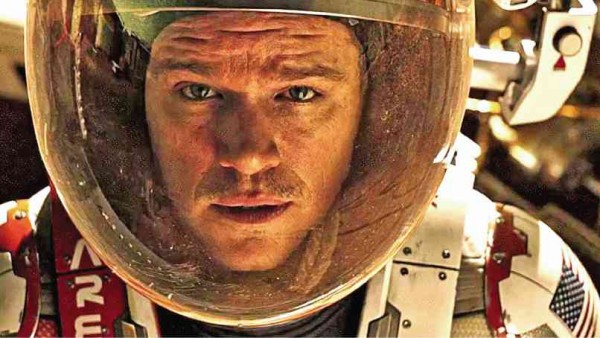Matt Damon’s do-or-die mission turns science fiction into science fact
WHAT WOULD you do if you find yourself stranded and alone on the fourth planet from the sun—and help is 140 million miles away? In Ridley Scott’s Nasa-approved dramatic thriller, “The Martian,” Matt Damon convincingly turns science fiction into science fact when his character, astronaut Mark Watney, a botanist and mechanical engineer, is separated from the rest of the 31-day mission’s six-man crew on Mars!
Impaled by an antenna, Watney is left for dead after the surviving crew (Jessica Chastain, Sebastian Stan, et al.) avoids a blanket of fog and 4,000 tons of talcum-powder grit in a raging and fast-approaching sandstorm—and evacuates to return to Earth.
Mark must survive for the four years it’ll take for a rescue mission to reach him—if it gets the go signal from the Houston control center.
The dilemma is nothing short of Solomonic: Would you risk the lives of five guilt-stricken astronauts to save the man they left behind?
Watney is acutely aware of his dire situation, but his most urgent concern is how to survive on a desolate planet incapable of growing the potatoes—his only source of food—he needs to survive:
Article continues after this advertisementRed soil
Article continues after this advertisementMark builds 128 square meters of enclosed vegetable farm, “creates” combustible water and begins growing rows of lamp-assisted but human-poo-fertilized (!) potatoes sprouting from the red Martian soil!
You’ll have a hard time following some of the film’s scientific mumbo-jumbo, especially the zero-gravity action that ensues during the spectacular, heart-in-mouth rescue sequences—but, Damon, Scott (“Blade Runner,” “Alien”) and the experts from Nasa make the near-impossible situation plausible and edge-of-your-seat credible.
Like Sandra Bullock’s character in Alfonso Cuaron’s groundbreaking “Gravity,” Watney must rely on his scientific skills, common sense and the will to survive when things don’t go as planned (and, on a strange and unchartered terrain, they often don’t)—or, when he accidentally blows his greenhouse into smithereens!
With its roller-coaster pace, Scott’s big-screen adaptation of Andy Weir’s hard-science novel imagines Mars as an eerie planet teeming with wonder and unspeakable danger—but, he doesn’t allow its spectacle to undermine character and narrative development.
Its exposition shuttles between Damon’s one-man survival story on Mars and the hard decisions Chastain and her team make in their do-or-die mission.
It doesn’t hurt that Damon and his latest screen alter ego are likable chaps who aren’t hard to root for. When Mark isn’t farming, he’s busy streamlining and refining his SOS game plan—or grooving to Donna Summer’s disco music!
Watney’s fears, frustrations, anger, sense of hope and indomitable fighting spirit fuel Scott’s urgent survival piece, and inspire unity and cooperation among conflicting nations in the world—a cinematic prayer for peace!
How does Damon sustain his film and character’s viewability? He cleverly digs deep for laughs, and makes Watney’s struggle remarkably “relatable.” So, when the plausibility or impossibility of rescue finally dawns on Mark, you laugh and cry just as hard!
